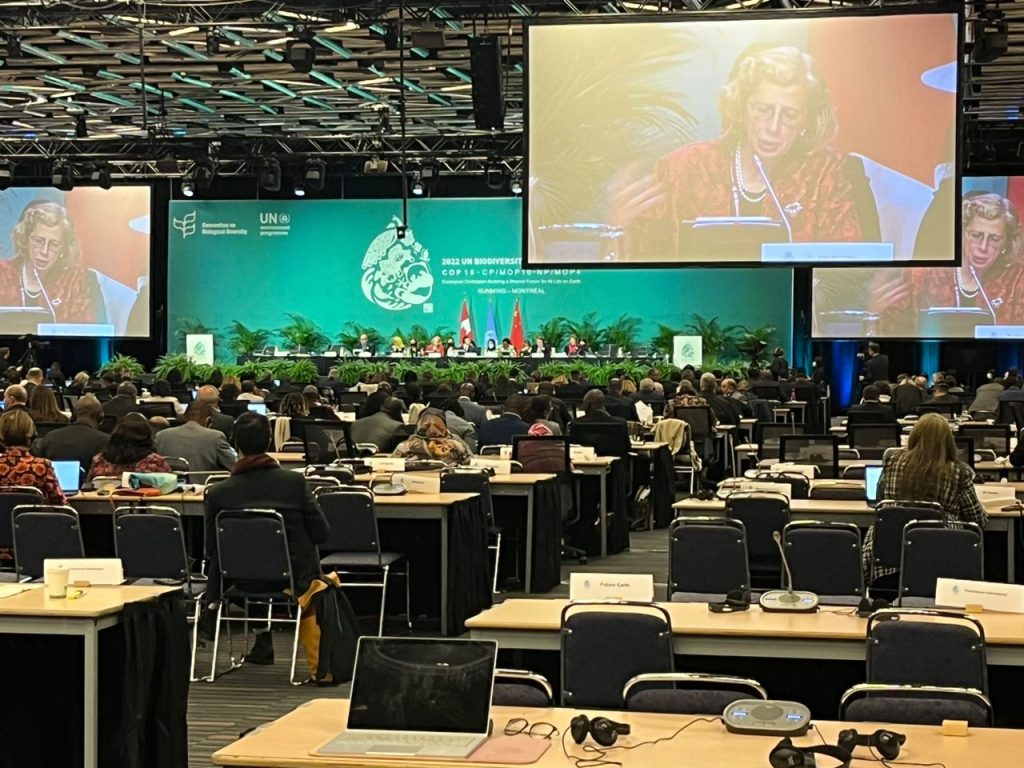By Albert Oppong-Ansah, GNA’s Special Correspondent, Montreal, Canada (Courtesy of the Environmental Protection Agency and Nuclear Power Ghana)
Montreal (Canada), Dec. 16, GNA – Ghana has called on developed countries to allocate one per cent of the retail price of all commercial income from the utilisation of genetic resources and traditional knowledge associated with genetic resources to the country of origin.
Genetic materials are the actual values of plants animals, microbial or other origins containing functional units of heredity.
Funds from these resources can be used to undertake activities to conserve biological diversity and the sustainable use of its components.
Often resources such as shea, cocoa, and trees are utilised for commercial and private educational purposes, which do not benefit the country of origin.
Dr Kwaku Afriyie, the Minister of Environment, Science, Technology and Innovation made the call in a televised statement at the High Level 15th Meeting of the Conference of the Parties to the Convention on Biological Diversity (COP15) on-going in Montreal, Canada.
Canada is hosting the meeting under the Presidency of China, being attended by government officials, academia, civil society organisations, and other actors from around the world.
It is to set new goals and develop an action plan for nature over the next decade, called the post-2020 global biodiversity framework.
The set goals are expected to be approved by governments and implemented locally by all countries to live in harmony with nature.
The three broad themes are: Reducing Threats to Biodiversity; Meeting People’s Needs through Sustainable Use and Benefit-sharing; and Tools and Solutions for Implementation and Mainstreaming.
Dr Afriyie said the Government would ensure that biodiversity values were mainstreamed into all decision-making processes, including policies, programmes, strategies and projects, planning and budgeting.
He urged states to strengthen cross-sectoral coordinating mechanisms on biodiversity at all levels.
“This way, we believe biodiversity would be valued and conserved to enable it to provide the ecosystem services they are expected to provide.”
At the local level, Dr Afriyie said the Government would continue to promote the contribution of local communities, women and the youth to biodiversity conservation, and ensure that communities owning such resources benefitted from funds for biodiversity utilisation.

Ms Elizabeth Maruma Mrema, the Executive Secretary of the Convention on Biological Diversity, said protecting biodiversity had many benefits including reducing the impacts of climate change, poverty, and addressing many of the sustainable Development Goals.
“Despite the immense benefits, biodiversity is declining at a faster rate. It is heading to a point of no return but COP15 must be a turning point,” she said.
Ms Mrema asked parties to put aside their differences to achieve a common goal of protecting nature and turning assurances into bold actions.
Mr Csaba Korosi, the 77th President of the UN General Assembly, urged parties to respect the rights of those in vulnerable situations and support them.
He urged countries to take the necessary steps to address the economic drivers of biodiversity and live sustainably.
“Our greed and selfishness must stop. We need radical changes to sustain mother earth,” Mr Korosi said.
He urged governments to end harmful subsidies for fossil fuel exploration and encouraged business towards circular economy – a model of production and consumption, which involves sharing, leasing, reusing, repairing, refurbishing and recycling existing materials and products as long as possible.
Mr Steven Gilbeatult, the Minister of Environment and Climate Change, Canada, said the call for increased funding was not out of place and that Canada would work with parties to mobilise funding to support developing countries.
He urged these countries to source funding from the Global Environmental Facility as well as unlock private support to undertake conservation activities.
GNA